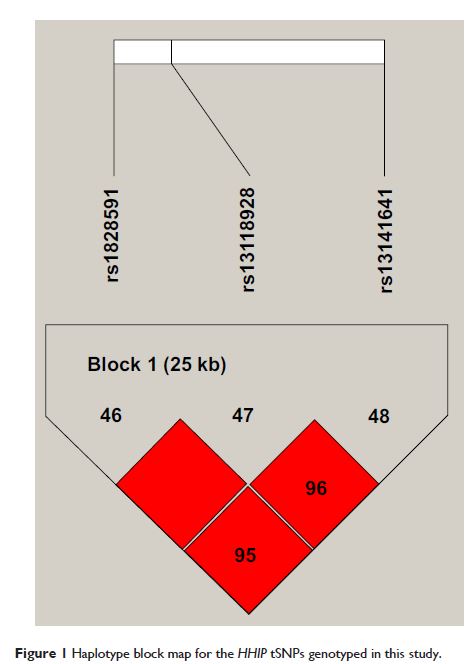108605
论文已发表
注册即可获取德孚的最新动态
IF 收录期刊
- 3.4 Breast Cancer (Dove Med Press)
- 3.2 Clin Epidemiol
- 2.6 Cancer Manag Res
- 2.9 Infect Drug Resist
- 3.7 Clin Interv Aging
- 5.1 Drug Des Dev Ther
- 3.1 Int J Chronic Obstr
- 6.6 Int J Nanomed
- 2.6 Int J Women's Health
- 2.9 Neuropsych Dis Treat
- 2.8 OncoTargets Ther
- 2.0 Patient Prefer Adher
- 2.2 Ther Clin Risk Manag
- 2.5 J Pain Res
- 3.0 Diabet Metab Synd Ob
- 3.2 Psychol Res Behav Ma
- 3.4 Nat Sci Sleep
- 1.8 Pharmgenomics Pers Med
- 2.0 Risk Manag Healthc Policy
- 4.1 J Inflamm Res
- 2.0 Int J Gen Med
- 3.4 J Hepatocell Carcinoma
- 3.0 J Asthma Allergy
- 2.2 Clin Cosmet Investig Dermatol
- 2.4 J Multidiscip Healthc

EGLN2 和 RNF150 基因变异与中国人口中慢性阻塞性肺疾病的风险的相关性
Authors Ding YP, Niu H, Yang H, Sun P, Chen Y, Duan ML, Xu DC, Xu JX, Jin TB
Published Date January 2015 Volume 2015:10(1) Pages 145—151
DOI http://dx.doi.org/10.2147/COPD.S73031
Received 21 August 2014, Accepted 4 November 2014, Published 13 January 2015
Purpose: Chronic
obstructive pulmonary disease (COPD) is a major and an increasingly prevalent
health problem worldwide. It has been reported that genetic variation may play
a role in the development and severity of COPD. The purpose of this study was
to investigate whether single nucleotide polymorphisms in multiple genetic
variants were associated with COPD in a Chinese population from Hainan
province.
Methods: In this case-control
study, including 200 COPD patients and 401 controls, we genotyped 14 tag single
nucleotide polymorphisms and evaluated their association with COPD using the Χ 2 test and genetic
model analysis.
Results: The polymorphism,
rs10007052, in the RNF150 gene was
significantly associated with COPD risk at a 5% level (odds ratio =1.43, 95%
confidence interval, 1.06–1.95, P =0.020). In the
log-additive model, the minor allele (C) of rs10007052 in the RNF150 gene (P =0.026) and the minor allele (C)
of rs3733829 in the EGLN2 gene (P =0.037) were associated with COPD
risk after adjustment for age, sex, and smoking status. Further haplotype
analysis revealed that the “CT” haplotype composed of the mutant allele (C) of
rs7937, rs3733829 in the EGLN2 gene, was
associated with increased COPD risk (odds ratio =1.55; 95% confidence interval,
1.05–2.31; P =0.029).
Conclusion: Our findings
indicated that rs10007052 in the RNF150 and
rs3733829 in the EGLN2 gene were
significantly associated with the risk of COPD in Chinese populations of Hainan
province. These data may provide novel insights into the pathogenesis of COPD,
although further studies with larger numbers of participants worldwide are
needed for validation of our conclusions.
Keywords: case-control studies,
COPD, tag single-nucleotide polymorphism
